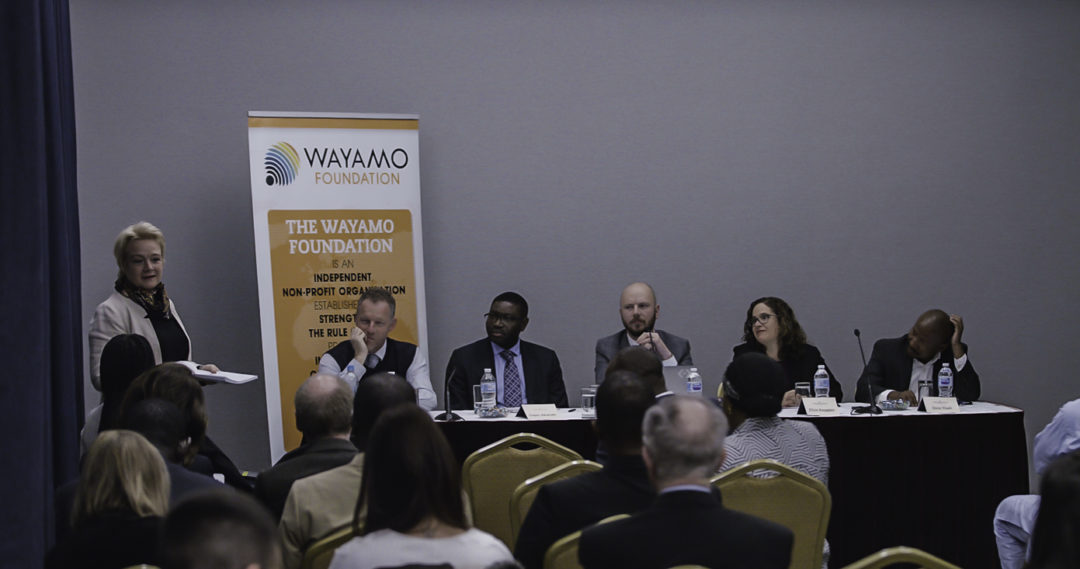Assembly of States Parties Side Event: Immunities under international law
Click here for pictures.
On Friday 8 December 2017, the Wayamo Foundation held a side event during the 16th Annual International Criminal Court Assembly of States Parties. Co-hosted by the governments of the Republic of Uganda, Republic of Sierra Leone and Federal Republic of Nigeria, the event was entitled “Immunities Under International Law.”
The event began with opening remarks from Ambassador Adonia Ayebare from Uganda, who highlighted the importance of the event given the existing concerns surrounding head of state immunity in international justice. Ambassador Amadu Koroma, DPR 1 for Political Affairs and the Permanent Representative of Nigeria to the United Nations, Tijjani Muhammad Bande, also attended the event.
2018.01.29 “Immunities Under International Law” Report by Wayamo Foundation on Scribd
Executive summary:
Moderated by Deputy Director of the Wayamo Foundation, Mark Kersten, the panel was opened with remarks describing Wayamo’s ongoing efforts to provide a respectful and productive forum to explore the ongoing issue and controversy of head of state immunity before the ICC. The first panellist was Dapo Akande, Professor of Public International Law, University of Oxford and member of the Africa Group for Justice and Accountability (AGJA). Akande set the scene by briefly by noting the evolution of the immunity debate and what he called the confusing jurisprudence emerging from the International Criminal Court, particularly with regard to the failure by states to arrest Sudanese President Omar al Bashir. Akande commented on the political sensitives, and differing legal perspectives. He concluded by stating that the most convincing position was that advanced by the Pre-Trial II of the ICC on 6 July 2017, a position he had previously espoused. It stated that (by imposition of the Security Council acting under Chapter VII of the UN Charter), the customary international law immunities afforded to President Bashir do not bar states parties from executing the Court’s request of his arrest and surrender.
His remarks were followed by Dire Tladi, Professor of International Law, University of Pretoria, Special Adviser to the Minister of International Relations and Co-operation, and member of the UN International Law Commission who began by noting that the current expectation that ICC member states (who are also members of the African Union) arrest sitting heads of state puts them in the precarious position of being unable to host an African Union Summit. He also introduced a concept note presented to the African Union ‘s Open- Ended Committee of African Ministers on the ICC on 21 September 2017. The concept note suggests, amongst other factors, that referrals made by the United Nations Security Council to the ICC should be explicit with regard to the waiver of immunities.
Elise Keppler, Associate director of the International Justice Program at Human Rights Watch, warned against the provision of immunity for seating heads of state accused of committing core international crimes. She detailed that allowing immunity for sitting heads of state is not only an endorsement of impunity but that it is also a violation of the principle of equality before the law.
Max du Plessis, Advocate of the High Court of South Africa and Associate at Doughty Street Chambers London, agreed that the question of head of state immunity before the ICC remained a live issue. He stressed the need for sober minds to reflect on this issue and for South Africa to remain engaged with the ICC throughout this process — and, indeed, to show leadership on this question rather than withdraw from the Rome Statute. He also underlined the importance of seeking clarity from the United Nations Security Council for future referrals. Du Plessis observed that, thus far, domestic courts faced with the issue have done a great deal of the “heavy lifting” whilst the ICC judges have issued conflicting rulings and the UNSC has remained silent.
Inspired by the spirited and opposing views presented by the panellists, there were numerous questions from members of the audience. A lively debate followed and panellists were then given an opportunity to make closing remarks.


